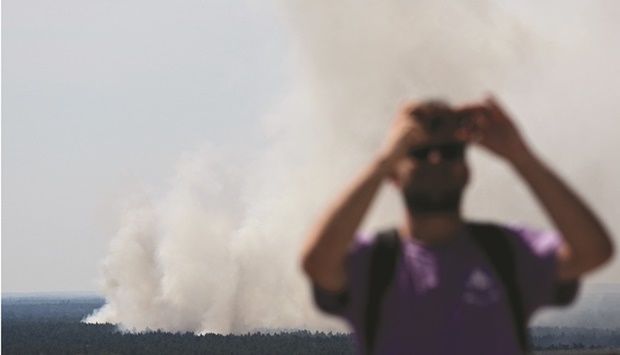An “unprecedented” fire broke out yesterday around a German police munitions storage site in a popular forest in western Berlin, sending plumes of smoke into the skies and setting off a series of explosions.
The fire began in the Grunewald forest in the early hours of the morning, with residents reporting a series of explosions.
Firefighters were initially unable to tackle the blaze directly due to the danger of further blasts, with emergency services setting up a 1,000m (3,280’) safety zone around the site.
Around 250 emergency personnel were deployed to the site.
The fire had spread across 50 hectares by the evening, according to police, but the emergency services were hoping to bring it under control overnight.
The most dangerous zones have been identified and firefighters have been cleared to proceed to within 500m of the blaze in some areas, they said.
The army had earlier sent in a tank aimed at evacuating munitions at the affected storage site as well as remote-controlled de-mining robots, while drones circled the air to assess the emergency.
The firefighters laid hoses through the forest from nearby rivers and lakes, and an armoured vehicle supplied by the Bundeswehr was cutting a fire break through the forest at the southern edge of the perimeter zone.
“Everything is prepared at the borders of the perimeter. That is where we want to stop it,” a spokesperson for the fire service told Reuters.
Water cannons were also deployed around the safety zone to prevent the fire from spreading.
However, authorities said that no firefighting helicopters were available as they were already in use to tackle forest fires in eastern Germany.
They also said the 1,000m safety zone applied to the air, so there was a limit to how useful it would be to drop water on the fire from above.
Berlin mayor Franziska Giffey interrupted her holiday to visit the scene, calling the events “unprecedented in the post-war history of Berlin”.
She advised Berliners to close their windows but said the danger was minimal as there were no residential buildings within a 2km (1.2-mile) radius and so no need to issue evacuation orders.
Road and rail traffic had been disrupted but was expected to return to normal in the course of the evening.
The fire came as a heatwave swept across Germany, with temperatures hitting 39° Celsius (102° Fahrenheit) yesterday.
Scientists say climate change is making heatwaves around the world more frequent and more intense, which increases the risk of fires.
Germany has suffered a series of forest fires this summer, with Brandenburg – the state that surrounds Berlin – among the hardest hit areas, along with the mountainous parts of Saxony state.
Police said they were investigating what set off the fire in Grunewald.
The store holds munitions uncovered by police, but also unexploded World War II-era ordnance which is regularly dug up during construction works.
German media have questioned the wisdom of having a bomb disposal site located in a major city.
“At least 25 tonnes of World War II ammunition and illegal fireworks were hoarded at the munitions site there, in the middle of the forest. How can this be?” Berlin newspaper BZ asked.
Cyclist Hellmut Schmidt, 64, who commutes through the forest to work, told AFP that “when you see all these fires, of course you worry”.
“But I don’t know where else you could have (a munitions site) in Berlin ... if it was further from the city, then it would also be dangerous with the transport because something could explode,” he said.
Giffey said local authorities would “have to think about how to deal with this munitions site in the future and whether such a place is the right one in Berlin”.
The German capital is rarely hit by forest fires, even though its 29,000-hectares of forests make it one of the greenest cities in the world.
Heavy thunderstorms are expected to sweep into the country from the west today, the German weather service said.
A cold front is predicted to bring temperatures down by more than 10C overnight in western Germany, falling to around 20-25C today.
Berlin frequently carries out bomb disposal operations as explosives are still being discovered from World War II.
The Grunewald site is used to defuse such old munitions, as well as weapons and fireworks, a fire department spokesperson said.
It has been in operation since 1950 and is equipped with fire alarm systems and a firebreak that is several metres wide, police said on Twitter.
The explosives stored there were being continuously sprinkled with water.

A man takes pictures as smoke billows over Grunewald forest in Berlin.
